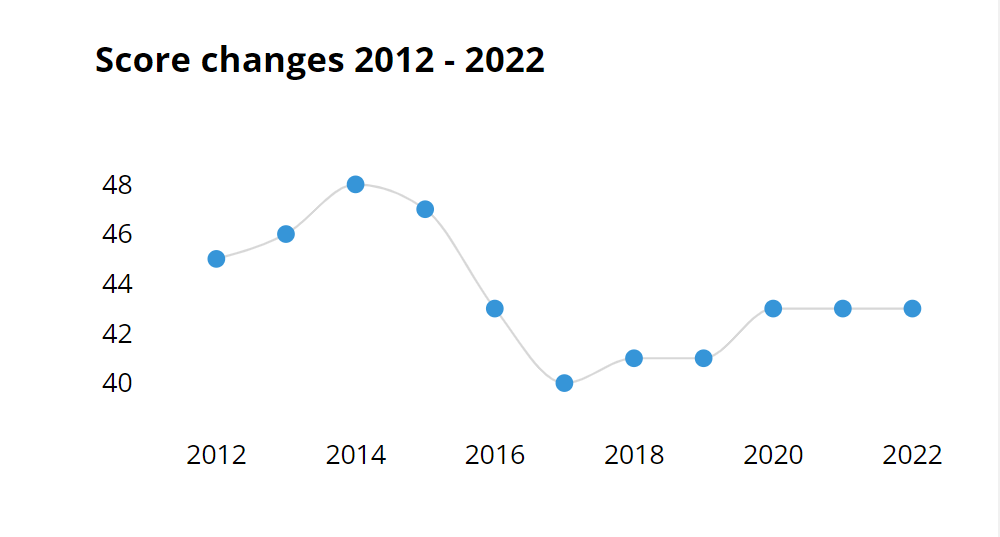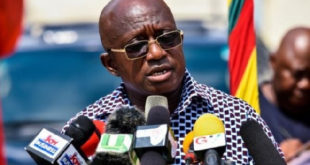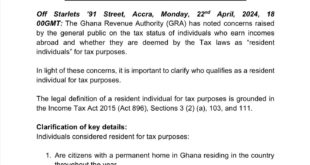Ghana has stagnated in the Corruption Perceptions Index (CPI) scoring 43 out of 100 for the third time.
It has maintained the score since 2020.

The country currently ranks 72nd out of 180 countries ranked in the world.
This was captured in a report released by Transparency International.
Since its inception in 1995, the Corruption Perceptions Index, Transparency International’s flagship research product, has become the leading global indicator of public sector corruption.
Per the latest report released on January 31, 2023, Denmark is leading the chart with a score of 90 followed by Finland with a score of 87.
Three countries at the bottom of the list are South Sudan (13), Syria (13) and Somalia (12).
On the African continent, Seychelles continues to lead the region with a CPI score of 70, followed by Botswana and Cabo Verde, each with 60.
Burundi (17), Equatorial Guinea (17), South Sudan (13) and Somalia (12) performed the lowest in the bloc.
“Seychelles continues to lead the region with a CPI score of 70, followed by Botswana and Cabo Verde, each with 60. Burundi 17, Equatorial Guinea 17, South Sudan 13, Somalia 12 perform the lowest,” the International Transparency International report stated.
Global Assessment
According to Transparency International, the world is experiencing stagnation in the fight against corruption.
The 2022 Index, it said, shows that most countries are failing to stop corruption.
It shows that more than two-thirds of countries scored below 50, while 26 countries have fallen to their lowest scores yet.
Meanwhile 155 countries have made no significant progress against corruption or have declined since 2012.
“Countries in the top-scoring region, Western Europe and the European Union, have been at a standstill for over a decade or have declined over the past five years. Undue influence over decision-making, poor enforcement of integrity safeguards and threats to the rule of law continue to undermine governments’ effectiveness.
“On the other end of the index, countries with low scores are also unable to make significant progress. In many parts of the Americas, Eastern Europe and Central Asia, and Sub-Saharan Africa, restrictions and attacks on civic space and basic freedoms continue as multiple crises threaten security and stability, democracy and human rights.
“Similarly, in various Asia Pacific countries, rising authoritarianism dilutes civil society’s function as a watchdog, while many leaders are prioritising economic recovery over anti-corruption efforts. In the Middle East and North Africa, where unequal political and economic power is deeply intertwined with conflict, corruption is undermining democratic processes, causing pervasive civil unrest and fuelling violence.”
Sub-Sahara Africa
Transparency International noted that 44 of the 49 countries assessed still score below 50.
Seychelles leads the region with a CPI score of 70, followed by Botswana and Cabo Verde, each with 60. Burundi (17), Equatorial Guinea (17), South Sudan (13) and Somalia (12) perform the lowest.
For Botswana, the Index found that it has a robust democratic system in which the legislative and policy frameworks have continuously been improved.
In the region, Seychelles, Angola, Côte D’Ivoire, Senegal, Kenya, Tanzania have improved in the past years, the report said.
On the other hand, Lesotho, Mali and Liberia have seen significant decline in scores.
GII reacts to report
Meanwhile, the Programmes Manager of the Ghana Integrity Initiative, Mrs. Mary Awelana Addah, in an interview said the development means Ghana is not making any progress in its fight against corruption.
“This lack of progress is a worrying phenomenon. It means that our fight against corruption is at a standstill and I believe it’s a source of worry because we all know and see the evidence of that in our policy space each and every day,” she added.
Mrs Addah said Ghana’s stagnation on the index could be attributed to bribery, perceptions about the diversion of public funds during the COVID-19 pandemic, state capture, nepotism and the use of public office for private gain.
Thanks for reading from MyGhanaMedia.com as a news publishing website from Ghana.
Source: MyGhanaMedia.com
 MYGHANAMEDIA.COM Best Source Of Latest News
MYGHANAMEDIA.COM Best Source Of Latest News





